As a part of the Foundation Course training, we, the Officer Trainees (OTs) are sent on a one week Village Visit program. The Villages are shortlisted with the help of the District administration, and this time, we had a set of villages ‘chosen’ for us from Haryana, Punjab and Uttar Pradesh.
We (me along with another five OTs) were assigned a village with the name ‘Jogither‘ (the place where Jogis stayed!) in the district Pilibhit of Western UP (not sure why it is known as a part of Western UP, on the map it is towards the northern edge bordering Nepal in the central part of the state).
I have previously tried to plan such visits covering a stretch of places from Andhra to West Bengal through the east coast (not just to visit as a tour, but to understand the issues and the lifestyle of rural India), but the plan could not materialize. But now, after this visit to a single village, I came to understand how tough it would have been to make such a trip. Such visits are something probably, only a government service can provide in a thorough way. The way the administration has made the arrangements (though to appease or impress, whatever the reason may be), it would be practically next to impossible individually to make such visits. Though I said its impossible, please try and visit the nearby village for some time at least, and find how much you could learn.
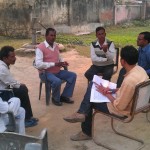
We were given one of the nicest welcome by the district administration (including the SDOs/Tehsildars etc) soon after we reached the district headquarters (Pilibhit). Next we headed to the Village, with accommodation in the Primary Health Center (PHC) of the Village. The PHC was not having any electricity supply till now and thanks to our visit, it got the ‘light’ !
We tried to meet all the ‘important’ people of the village, the Gram Pradhan, the BDO of the block, The Patwari, Village Panchayat Secretary and few others. The discussions with them were very educative, we came to know about the working of the grass root institution, the Gram Panchayat. The only other lowest institution is the Gram Sabha, the total attendance of all the people of the village, which is not working ! No Gram Sabha meetings happen in this village (defeating the very idea of decentralisation and power to the people), because of the lack of awareness and the general anti-government attitude of the people. A village with a population of around 3000 is not even having the slightest confidence in the working of either the political or the administrative institutions at any of the village/block/tehsil/district levels. We got to know the working of each of these officials, the institutes and how in general, a ‘file’ moves from one office to the other.
We wanted to meet with the villagers, go around the village (Village Walk) and visit some of the primary schools, banks, plantations etc. We were doubtful how to mobilize people, but to the easiest of surprises, all the village people were very enthusiastic (for various plausible reasons, of course) and approached us, and we had some real home feel among them. The students of the primary and junior school (and inter college) were the most active and interested, they met us every day of our stay from then on.
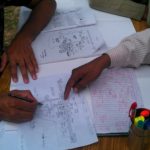
We tried to tell to the officials along with us to not to follow us as the people would not like to open up in front of the officials, especially the local ones. The officials did heed to our request and left us alone on our village walk.
The very walk through the gullies of the village gives a direct idea of the problems being faced. Once we are in the ‘backward’ block of the village where most of the harijans and muslims reside, we found the worst of sanitation levels with no electricity at all (when other ‘high caste blocks’ did have the electricity connection, at least). They do not have the water pumps working properly, the garbage is not collected at all and most of the homes do not have private latrines. We are indeed six IAS/IFS officers for a single village, but in practise, it is one or two IAS/IPS for a full district. You could directly see the difference of proportions!
The school visits are the most thrilling, students are very interested to learn, some of them looked very smart at their studies. We just hope we could spend more time.
We had a get-together of all the people under a tree (typical village sit setup), and tried to reason out with people on the issues like mid-day meal scheme, local sanitation and cleaning, education of children, grievance redressal and etc. They all came up with their issues and wanted us to solve those for them. We tried hard to explain that we are on a study and learning visit and do not have as such any authority to take or initiate any action. But the mere presence in their locality have given those people the confidence that we are trying to help them, and the grievances poured in. We continuously got applications (some in hand writing) expecting us to forward to the concerned. We did take up most of the issues, tried to understand, with the help of the officials around us, how the issue is to be taken up and followed them up. We followed up the allotment and installation of 127 toilets in each of the houses which was stuck, as per the villagers. We also followed up with the cleaning up of the canal which was not cleaned fully in three years, and the work is supposed to be starting in a week. It is important for us (after we reach back to the academy) to follow up with the concerned officials to make sure the work is indeed taken up. We simply realised how important and effective is to have constant and regular and thorough follow ups.
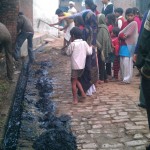
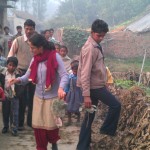
The meeting with the village panch, the JEs and other engineers / technical staff along with the Pradhan n the general public of the village, is one of the best things we did in the recent times. We were able to discuss on broad topics that were previously raised by the villagers and observed by our team. We made sure most of the people who attented the meeting are not just passive spectators but were active participants interacting with their issues and doubts. We clarified the people on various issues that were raised and observed over the last two days through our village visits and other discussions with various sections of the people. We were able to manage the discussions , control the excitement and agitations. Overall, there was committment and responsibility from everyone in trying to help resolve the issues.
The next day, we woke up at 530 AM and took up “Shramadaan“, where we all six ‘officers’ took up safai work and cleaned the whole of the village, for three hours. The intent is to create awareness among the villagers to keep their locality clean and to do it themselves without depending on any external agency or institution including the government. If we, supposedly big officers can clean a strange village, definitely everyone can clean their own house and beyond – that’s the message we delivered. We did have some enthusiastic participation from some of the youth of the village and children. I call it the most satisfying activity, with reasonable success as well.
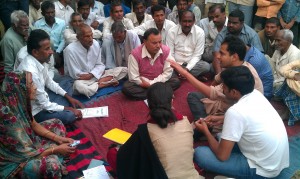
And all this could be possible only with the help of a keen type team, which we have the luxury of ! Some of the best and committed souls of the country are together, energetic and compassionate, the future leaders of the country, have no doubts.
We did try to give some of our brains to them, to generate some sense of awareness, but we learnt even more than what we got. Some of the elderly people of the village are the most experienced and they allowed us to have a glimpse of the decades of lifestyle in the village.
The four days we spent in the village are definitely the times of difference, they gave a sense of what kind of work lies ahead, and how we should, as civil servants should stay focused and eternally encouraged to handle such tasks. I hope we all can live up to the expectations and do some good work, going forward. I am completely encouraged and inspired.
Related Posts
Love playing Tennis. Love Movies
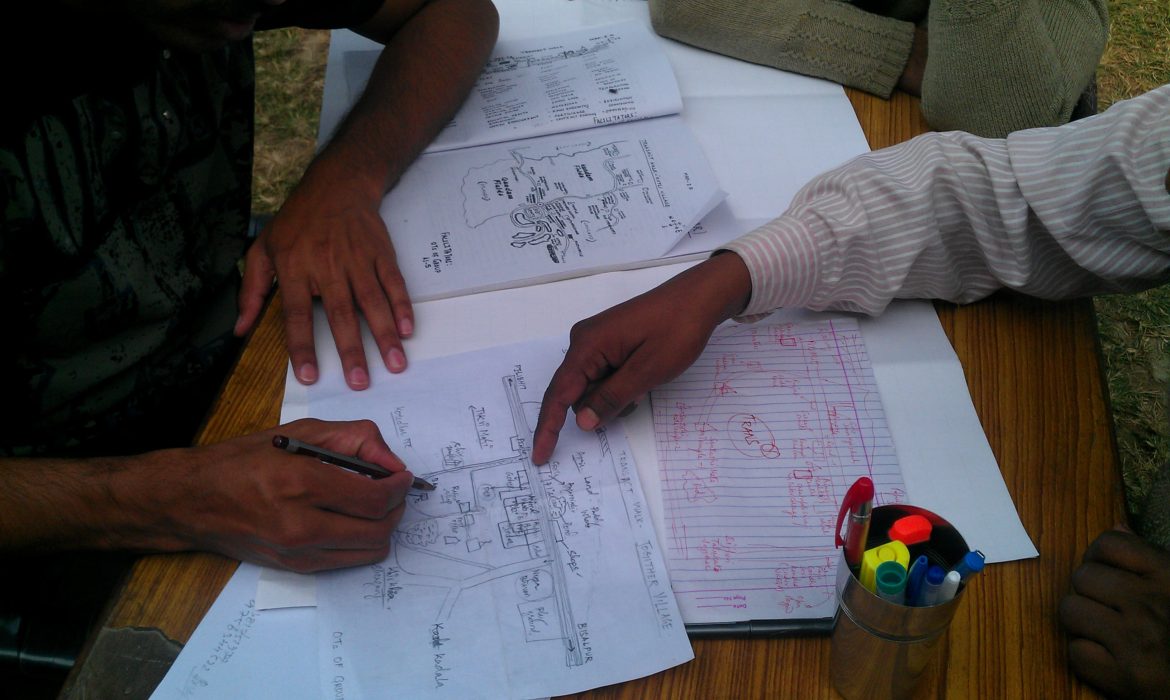











Indeed, unless we reach to them, we will be isolated from them and their problems.
Thank you !!
the crux is …be in touch with masses…and dont sit in AC environment….
Nice article sir…!!!
Thank you !
Your Shramadaan idea was commendable. Good luck kalyan
@Shivam …
The villagers are receptive in a way that, they are happy to obtain anything and everything from the government (read in both positive and negative sense). They feel all the responsibility of taking care of them lies with the govt. In this regard, they are happy to try and adopt modern/clean energy and any other technological advancements, if we could only take to their doorsteps.
There is no cultural bias or isolation of thoughts and practices in the villagers.
@ Raveesh … it was indeed a very interesting and learning experience. Shramadaan was a impromptu idea we had in our team discussions and it came out very well.
Thanks for sharing the experience. How receptive are the villagers in adopting modern clean electricity generation techniques viz wind energy solar energy and bio-gas?
You had a really interesting village visit. The shramdaan was certainly an eye opener.